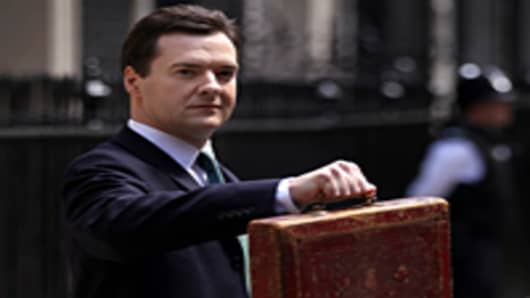George Osborne’s Budget brought to the top of the political agenda the question of how Britain taxes its wealthiest people — and simultaneously exposed tensions in the coalition.
Mr. Osborne intends to axe the 50p top rate of income tax, paid by people earning more than £150,000, during the lifetime of this parliament: the big question is when and on what terms.
Nick Clegg, the Liberal Democrat leader, told the Financial Times on Monday that any cuts in taxes on high incomes would be accompanied by moves to increase taxes on wealth, specifically on “very, very high value property”.
There is surprisingly little disagreement between Conservatives and Liberal Democrats on the desirability of getting rid of the 50p income tax rate but there is friction about how exactly the rich should be taxed on their mansions.
The chancellor and Lib Dem leader agree that the right time politically to remove the 50p ratewould be when the pressure is easing on low and middle-income families, who are enduring the biggest squeeze on their incomes since the 1920s.
That could come in the Budget of 2013 when the public sector pay freeze comes to an end and when, in the words of Mr. Clegg, low and middle earners may be “breathing more easily”.
Scrapping the 50p rate will be easier if Mr. Osborne finds it does not raise much money for the exchequer.
Revenue & Customs will conduct a review in January. Mr. Clegg suspects that the top rate has not “raised any money whatsoever”.
Tension rose on Monday after Mr. Clegg and Vince Cable, Lib Dem business secretary, interpreted Mr. Osborne’s Budget as the start of a “liberal” retargeting of the tax system away from income and enterprise and towards “unearned wealth”.
Mr. Clegg said he was “amazed” that few had spotted the significance of Mr. Osborne’s Budget assertion: “As well as reviewing revenues from the 50p tax rate, we will also be redoubling our efforts to find ways of ensuring that owners of high value property cannot avoid paying their fair share.”
Mr. Cable was asked whether this might include a revival of his policy of a 1 percent “mansion tax” on homes worth more than £2 million. “You need to have a proper basis for taxing property and I’m sure that’s one of the things we’re going to look at,” he told the BBC.
The Treasury immediately denied a new mansion tax was on the cards, insisting that Mr. Osborne’s Budget promise to make rich property owners pay “their fair share” was a reference to a tax avoidance crackdown, particularly on stamp duty.
Mr. Osborne was also angry that the Lib Dems had diverted attention from an entrepreneurial event he was attending with David Cameron in London.
“We had the Budget last week,” said one Tory insider. “The chancellor makes tax policy.” Mr. Clegg’s suggestion that higher council tax might be another way of taxing wealthy property owners was also rejected by allies of Eric Pickles, Tory communities secretary.
“The debate has just begun on this,” said one Lib Dem official. “If all George Osborne is talking about is tackling avoidance, that doesn’t go far enough.”
Mr. Clegg argues that a liberal tax system “rewards work and enterprise and captures pollution and unearned wealth”.
The Treasury does not see it in quite those terms but it is intent on taxing wealth and assets that are not easily moved offshore.
However, Mr. Clegg and Mr. Osborne do agree on one key point: if the rich are to gain from lower income taxes they will pay more on their expensive properties, one way or another.


